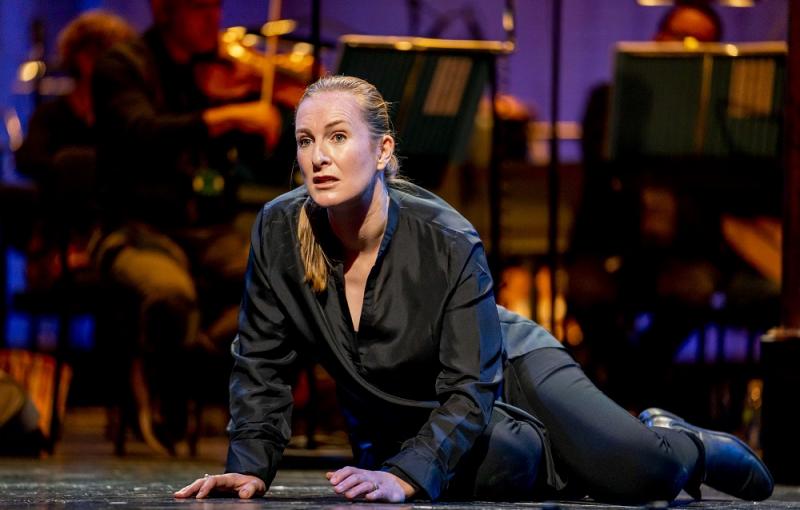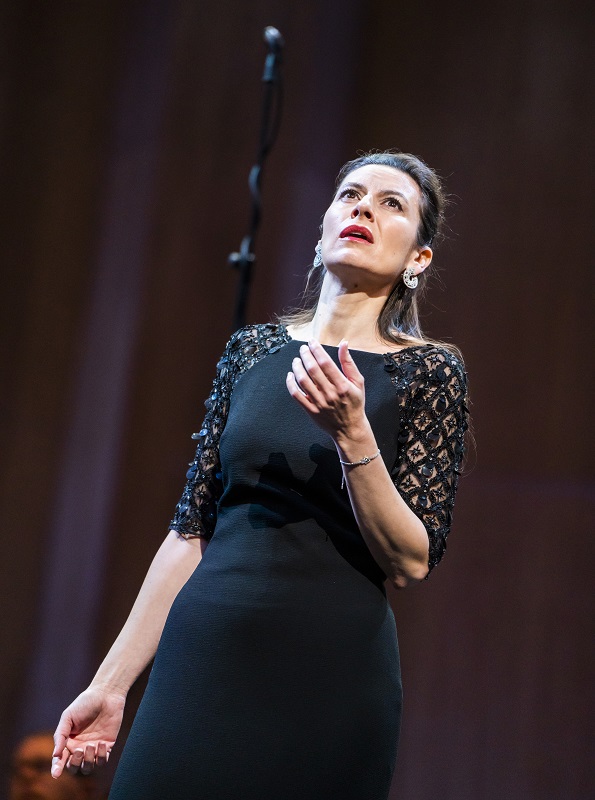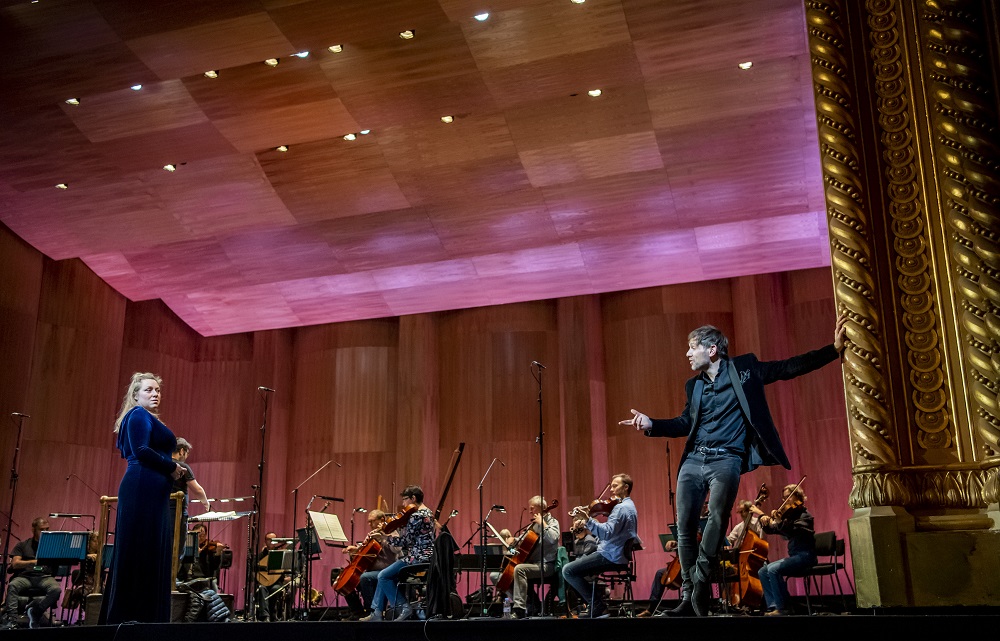Ariodante, Royal Opera online review – stylish, but confined | reviews, news & interviews
Ariodante, Royal Opera online review – stylish, but confined
Ariodante, Royal Opera online review – stylish, but confined
Accomplished ensemble tries its best to cross the footlights in livestream-only Handel

“After black and gloomy night, the sun shines all the brighter,” sings hero Ariodante after a life-threatening bout of jealousy nearly scuppers a royal wedding. There’s a snag in Handel’s dramaturgy: all that sunshine in preparation for the nuptials in Act One isn’t really earned.
It matters, and maybe a stage director for this score-free concert performance might have spruced everyone up; all seven singers command the stage, but with different gestural armouries. Only compare the elaborate but precise body language Adele Thomas drew from her two singers in Apollo and Daphne, the Handel cantata which opened the stunning 4/4 evening (admittedly they had props and costumes too).
 Slice in at any moment, though, and you will hear much fine singing put across with ample sense of meaning. The roles of Ariodante and his beloved, then wronged, Ginevra, are taken by two singers who command the stage. We've seen too little of Irish mezzo Paula Murrihy in London of late, though she shone in another trousers role, that of Ascanio in Berlioz's Benvenuto Cellini, at ENO. Her sympathetic presence has you on the noble knight’s side very quickly.
Slice in at any moment, though, and you will hear much fine singing put across with ample sense of meaning. The roles of Ariodante and his beloved, then wronged, Ginevra, are taken by two singers who command the stage. We've seen too little of Irish mezzo Paula Murrihy in London of late, though she shone in another trousers role, that of Ascanio in Berlioz's Benvenuto Cellini, at ENO. Her sympathetic presence has you on the noble knight’s side very quickly.
There are bumps along the way. One of Handel’s greatest arias of sorrowful anger, “Scherza infida”(“Play on, faithless one”), is admirably done in principle, but the quiet dynamics of the lightly decorated returning main section, however dramatically contrasted with sudden outbursts of pain, threaten to sap the life out of the piece, and conductor Christian Curnyn surely needs to move it on here. It's a pity we don't get the Act Thee aria "Cieca notte" ("Blind night"), the only major casualty in a judicious series of cuts. Had this been given before a Royal Opera House audience, would it have run through at nearly three hours? Intervals have been dropped in all performances up to the second lockdown. As it is, you can take a break when you feel like it. And you're spared the potential irritation of a presenter.
Chen Reiss (pictured above) takes the palm with Ginevra’s “Il mio crudel martoro” (“My cruel torment”) at the end of this superb second act, meaning poured into each “Morte, dove sei tu?” (“Death, where are you?”). Hers is also the most developed characterisation, a petted princess momentarily caught off mental balance with a false accusation of infidelity and the (also false) news that her beloved has killed himself, but rising to tragic regal dignity at the end of that crucial aria and keeping her poise for the rest of the drama.  It says much for Gerald Finley that the King’s aria of suffering between the two bigger numbers has almost as much impact; this glorious bass-baritone stays resonant and focused throughout the range, and the authoritative gestures back it up. The scene where he wants to reach out to his wronged daughter but can't quite do it is a dramatic highlight in a work which doesn't allow for many shades (least of all in the jealousy/betrayal plot).
It says much for Gerald Finley that the King’s aria of suffering between the two bigger numbers has almost as much impact; this glorious bass-baritone stays resonant and focused throughout the range, and the authoritative gestures back it up. The scene where he wants to reach out to his wronged daughter but can't quite do it is a dramatic highlight in a work which doesn't allow for many shades (least of all in the jealousy/betrayal plot).
Iestyn Davies (pictured above with Sophie Bevan and the Royal Opera Orchestra) goes full out for dissatisfied, hate-spitting villainy as scorned suitor Polinesso; it’s not his fault if a proto-Iago doesn’t exactly fit well with a supremely limpid and flexible countertenor voice. Ed Lyon and Sophie Bevan as secondary love-interest are as fully engaged as the rest; the duet where they finally come together is as joyous and lovely as Ariodante’s with Ginevra. Classy work throughout, then, but there’s no disguising the fact that Handel wrote showpieces as well as deeply expressive numbers for specific voices to wow the audience in front of them. This team is fully professional, but let’s get back to Handel in the House as soon as possible.
The future of Arts Journalism
You can stop theartsdesk.com closing!
We urgently need financing to survive. Our fundraising drive has thus far raised £49,000 but we need to reach £100,000 or we will be forced to close. Please contribute here: https://gofund.me/c3f6033d
And if you can forward this information to anyone who might assist, we’d be grateful.

Subscribe to theartsdesk.com
Thank you for continuing to read our work on theartsdesk.com. For unlimited access to every article in its entirety, including our archive of more than 15,000 pieces, we're asking for £5 per month or £40 per year. We feel it's a very good deal, and hope you do too.
To take a subscription now simply click here.
And if you're looking for that extra gift for a friend or family member, why not treat them to a theartsdesk.com gift subscription?
more Opera
 La bohème, Opera North review - still young at 32
Love and separation, ecstasy and heartbreak, in masterfully updated Puccini
La bohème, Opera North review - still young at 32
Love and separation, ecstasy and heartbreak, in masterfully updated Puccini
 Albert Herring, English National Opera review - a great comedy with depths fully realised
Britten’s delight was never made for the Coliseum, but it works on its first outing there
Albert Herring, English National Opera review - a great comedy with depths fully realised
Britten’s delight was never made for the Coliseum, but it works on its first outing there
 Carmen, English National Opera review - not quite dangerous
Hopes for Niamh O’Sullivan only partly fulfilled, though much good singing throughout
Carmen, English National Opera review - not quite dangerous
Hopes for Niamh O’Sullivan only partly fulfilled, though much good singing throughout
 Giustino, Linbury Theatre review - a stylish account of a slight opera
Gods, mortals and monsters do battle in Handel's charming drama
Giustino, Linbury Theatre review - a stylish account of a slight opera
Gods, mortals and monsters do battle in Handel's charming drama
 Susanna, Opera North review - hybrid staging of a Handel oratorio
Dance and signing complement outstanding singing in a story of virtue rewarded
Susanna, Opera North review - hybrid staging of a Handel oratorio
Dance and signing complement outstanding singing in a story of virtue rewarded
 Ariodante, Opéra Garnier, Paris review - a blast of Baroque beauty
A near-perfect night at the opera
Ariodante, Opéra Garnier, Paris review - a blast of Baroque beauty
A near-perfect night at the opera
 Cinderella/La Cenerentola, English National Opera review - the truth behind the tinsel
Appealing performances cut through hyperactive stagecraft
Cinderella/La Cenerentola, English National Opera review - the truth behind the tinsel
Appealing performances cut through hyperactive stagecraft
 Tosca, Royal Opera review - Ailyn Pérez steps in as the most vivid of divas
Jakub Hrůša’s multicoloured Puccini last night found a soprano to match
Tosca, Royal Opera review - Ailyn Pérez steps in as the most vivid of divas
Jakub Hrůša’s multicoloured Puccini last night found a soprano to match
 Tosca, Welsh National Opera review - a great company reduced to brilliance
The old warhorse made special by the basics
Tosca, Welsh National Opera review - a great company reduced to brilliance
The old warhorse made special by the basics
 BBC Proms: The Marriage of Figaro, Glyndebourne Festival review - merriment and menace
Strong Proms transfer for a robust and affecting show
BBC Proms: The Marriage of Figaro, Glyndebourne Festival review - merriment and menace
Strong Proms transfer for a robust and affecting show
 BBC Proms: Suor Angelica, LSO, Pappano review - earthly passion, heavenly grief
A Sister to remember blesses Puccini's convent tragedy
BBC Proms: Suor Angelica, LSO, Pappano review - earthly passion, heavenly grief
A Sister to remember blesses Puccini's convent tragedy
 Orpheus and Eurydice, Opera Queensland/SCO, Edinburgh International Festival 2025 review - dazzling, but distracting
Eye-popping acrobatics don’t always assist in Gluck’s quest for operatic truth
Orpheus and Eurydice, Opera Queensland/SCO, Edinburgh International Festival 2025 review - dazzling, but distracting
Eye-popping acrobatics don’t always assist in Gluck’s quest for operatic truth

Add comment